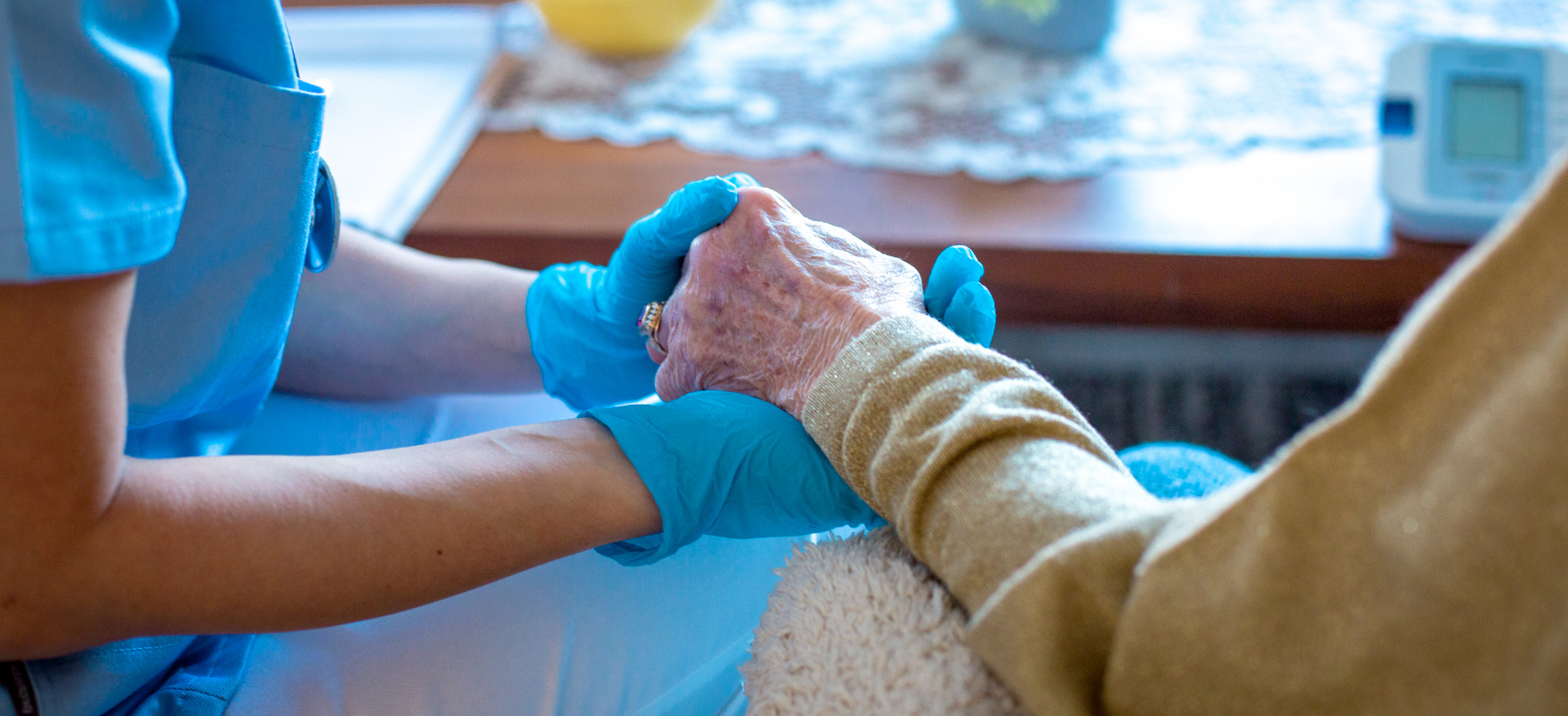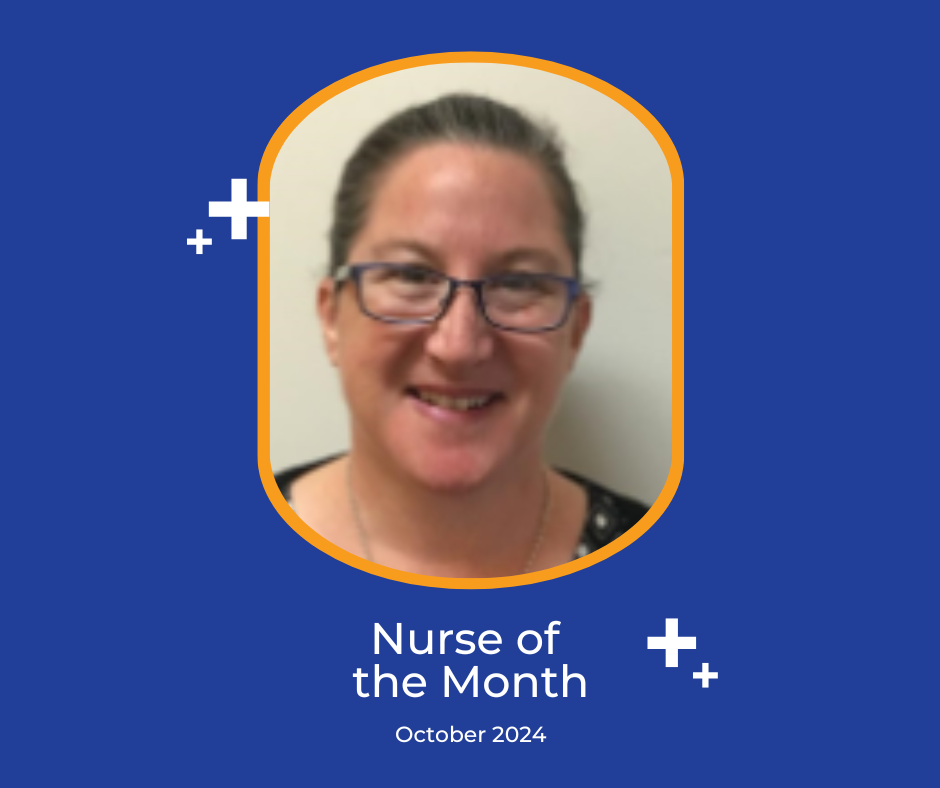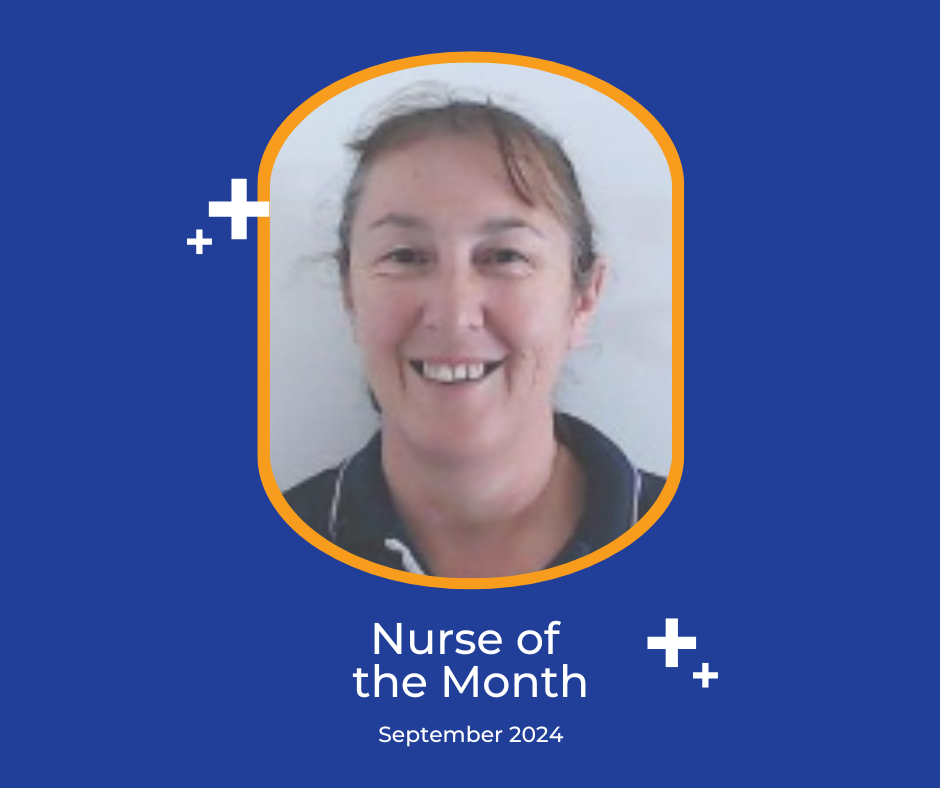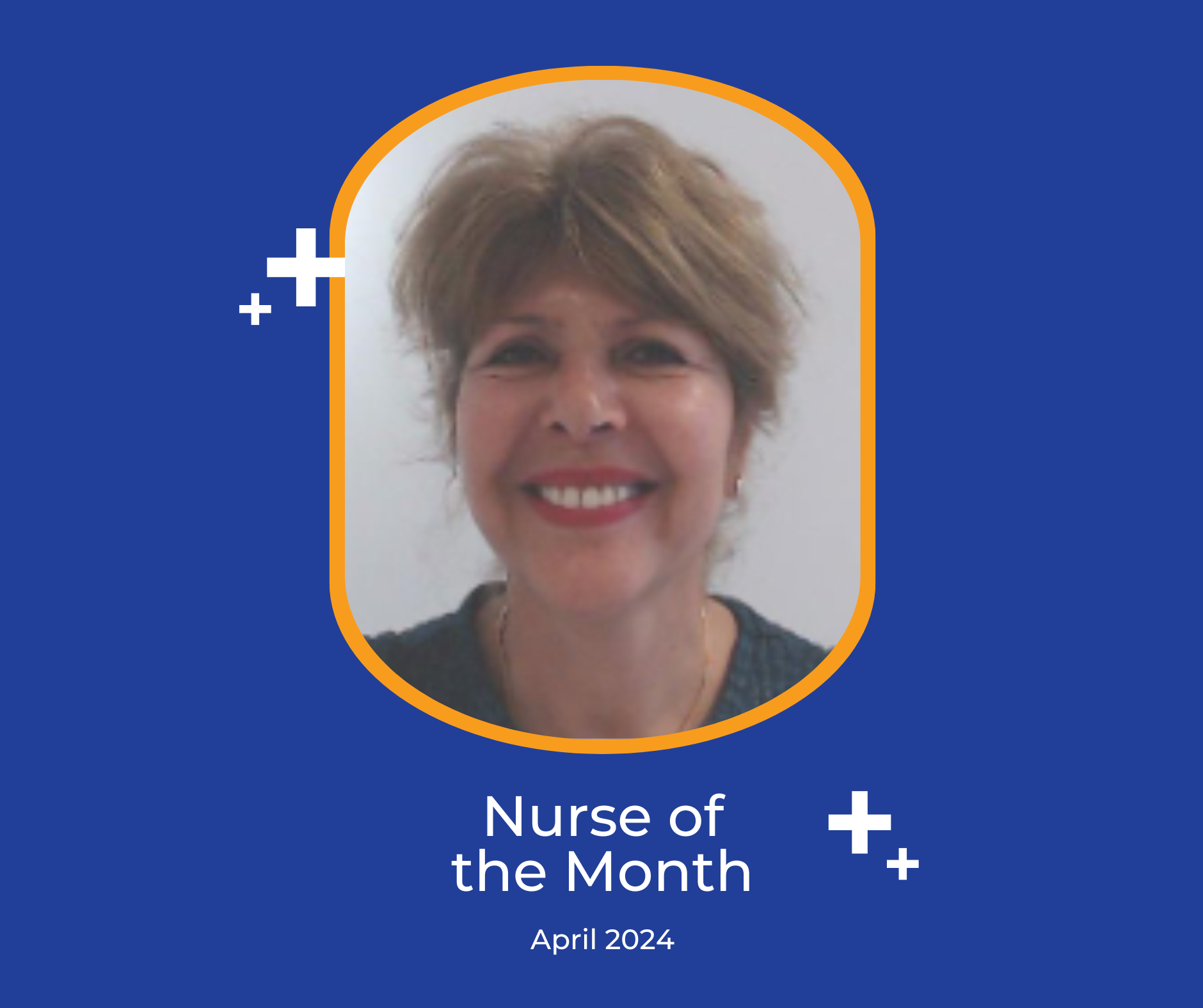An Agency Nurse’s perspective of end-of-life care

Agency nursing offers many opportunities and diverse work for nurses. End-of-life care is a critical aspect of this, requiring compassion, empathy, and sensitivity. As a nurse, you may often be entrusted with the care of patients in their final stages of life. Here are just a few ways our Agency Nurses provide compassionate end-of-life care.
What does compassionate end-of-life care mean to you, and why is it important?
To me, it’s an honour and a privilege to be able to go into someone's home and help them achieve what they and their loved ones want. You’re not there to change anything, you’re there to help them achieve what they want. Yes, we’re there to do all the nursing things, but we are also there to emotionally support them and we’re there to make them feel comfortable. - Margaret
Respect Individual Choices and Autonomy
Every individual has unique preferences and values. It's crucial to respect these choices, even when providing end-of-life care. Engage in discussions about treatment options, pain management, and quality of life to ensure the patient's wishes are honoured. Empower patients to make decisions that align with their values and beliefs. Similarly, respect cultural and religious practices, ensuring that the patient's spiritual needs are met. By recognising and honouring individual autonomy, you can provide compassionate care that upholds the patient's dignity and sense of control.
How do you ensure that patients are treated with empathy and respect during end-of-life care?
Firstly, I think it is an absolute honour to share a space with someone who is passing. But for me it’s very intuitive, I am constantly looking at their face and holding space for them; allowing them the time to speak and let them be heard. Whatever we’re doing I am always very aware of them, I never rush a process and ensure that my patient is comfortable. I give them 100% of me and am fully present. So, my mind is completely with them and so is my heart. - Charlie
Establish Open and Honest Communication
Compassionate end-of-life care begins with establishing open and honest communication with patients and their families. Take the time to listen actively and understand their fears, concerns, and desires. Encourage them to share their thoughts, allowing them to express their emotions freely. Be empathetic, sensitive, and non-judgmental in your responses. By creating a safe space for communication, you can help patients and their families feel supported and valued throughout the end-of-life journey.
How do you approach end-of-life discussions with patients and their families?
You need to be open really and have open communication. I know some have a fear of death, but we celebrate the birth of a child, I believe we should celebrate the life of someone when they’re passing. Understand where they’re at, how they are feeling and support them. I like to learn about the person I am caring for: what’s their favourite music, what type of room lighting they prefer etc. I make sure they have all their wishes met. - Charlie
Address Physical and Emotional Comfort
End-of-life care often involves managing physical symptoms and emotional distress. As an agency nurse, prioritize the patient's comfort by effectively managing pain, nausea, and other symptoms. Collaborate with the healthcare team to develop a personalized care plan that addresses the patient's unique needs. Additionally, provide emotional support by offering a listening ear, providing reassurance, and facilitating counselling or spiritual guidance when necessary. Compassionate touches, such as holding hands or gentle massages, can also provide immense comfort during this difficult time.
How do you involve the patient's family and loved ones in the end-of-life care process?
I give them the freedom to do what they need/want to do, and I leave them with the choice. I say, ‘would you like me to give Mum/Dad their pain relief now or would you like to give it?’ Usually, they are happy for me to give it and that’s fine, that’s what we’re there for. - Margaret
Involve and Educate Family Members
Supporting the patient's family is an integral part of compassionate end-of-life care. Keep family members informed about the patient's condition, treatment options, and any changes in care plans. Offer opportunities for family members to ask questions and express their concerns. Provide education on what to expect during the end-of-life process, including signs of approaching death. Encourage family members to participate in the care, if they wish, while respecting their emotional boundaries. By involving and educating the family, you can empower them to provide emotional support to their loved ones and ease the burden they may feel.
How do you take care of yourself and prevent burnout when providing end-of-life care?
What I do first, is I look forward to that phone call when I am asked to do a shift. That call means that someone needs me and aren’t I lucky that I’ve had a phone call that says I can go and do that. When I come home, I try and get to bed early and have as much sleep as I can. But to me it’s about your own internal attitude to how you view what you’re doing. And for me it’s an honour and a privilege. - Margaret
To be the best carer you need to take care of yourself, and you’ve got to make the time. I do take care of myself and as I am only human, I get sad when people pass away so when I get home, I write poetry or my emotions. I like to go to the gym, or a walk and do some meditation, I have lots of avenues to nourish myself. And before I go to a shift, I send love ahead of myself to my clients, to the family, to the hospital. I ask for my cup to be overflowing so that I can give that overflow to other people that need it. - Charlie


Margaret Charlie

As a nurse, you know how important care is. Every day, you’re providing a high level of care for others, helping them heal. But it’s equally as important to take care of yourself. Nurses are under a lot of pressure, so it’s time to reflect and work on your mental health. Not only will it help you maintain your energy and performance on the job, but it will also help you live a fulfilling life. Let’s dive into 10 things you can do to improve your mental health. 1. It’s ok to prioritise yourself You’re often prioritising others over yourself as a nurse. But sometimes, you need to take a break and give yourself some self-care. Many see self-care as a silly catchphrase that gets you doing more things like manicures, massages or shopping. But it doesn’t have to be. Instead, self-care is about prioritising your own well-being, setting boundaries, sleeping, eating well and just feeling connected with friends, colleagues or family. 2. Practice gratitude When you’re feeling tired, stressed, and overwhelmed, it can be very easy to forget about the things you appreciate. Practising gratitude helps shift your mindset. It helps you to focus on the positive things in your life, influencing your behaviour and attitude. To improve your gratitude, think of 3 positive things in your life every day and track them in a journal. 3. Do more of the things you love A great way to take a break from stress is to do the things that you love. Dive into your hobbies and enjoy the energy they bring into your life. Whether you enjoy knitting, reading, painting, video games, music, or more, make sure you set quality time aside to enjoy your hobby. These hobbies provide some therapeutic time to focus on yourself. Plus, they give you something fun to look forward to each day! 4. Exercise and eat well Exercise and food both have an enormous impact on your mental health. The foods you eat change your energy levels, with some nutrients burning out before the day is done. Focus on eating healthier foods that provide long-term energy, and don’t forget to take breaks to eat and drink while on shift. Exercising releases endorphins, endocannabinoids, and dopamine which are the chemicals that tell your brain that you’re happy and loving life. Exercise also promotes neuroplasticity and increases the oxygen supply to your brain. By exercising more you’ll feel happier, stronger, and have more stamina to deal with the day ahead. 5. Try out journaling Journaling is a great way to get the stress, anxiety, and emotional thoughts out in a safe and private space. Just write whatever comes to mind. It doesn’t have to be pretty, legible, or even actual words. Just express the thoughts and feelings you have onto the paper in whatever form they take. 6. Disconnect We live in a world rich in connectivity, information, and instant gratification. But that can also bring a lot of stress. We take that all in when we sit on our phones doom scrolling through social media, news sites, or watching videos. Take some time out of your day to put the phone away, hop off the internet, and enjoy the world around you. Go for a walk in a park, spend some time with friends, or just sit down with a good book and cup of tea. 7. Sleep Sleep has an enormous impact on your mental health. Our bodies use sleep to process the day behind us and prepare for the day ahead. Your brain needs time to go through your memories, and your body needs time to rest and recover. The average adult needs between 7-9 hours of sleep per night. Try to put more time aside for sleep so you can wake up feeling refreshed and energised. 8. Create a routine Routines help you gain a sense of accomplishment giving you an energising endorphin hit. A solid routine could be little things like setting an alarm, making your bed, and having a healthy breakfast. Little accomplishments help you start your day off on the right step giving you the energy you need. 9. Embrace mindfulness Mindfulness helps nurses develop skills they can use to manage clinical stress and improve their health. It’s a great tool for increasing overall attention, empathy, and presence with patients and families. Mindfulness exercises also help with work satisfaction, serenity, decreased incidental overtime, and reduced job burnout. You may have heard of mindfulness exercises before and have even tried some out. The best thing you can do is to practice them every day, so they become almost automatic and natural to you. The exercises don’t take much time, and you can do them anywhere. Start by sitting quietly and taking four or five long, slow, deep breaths, paying close attention to how you feel while you inhale and exhale. 10. Consider professional help If you’re struggling with feelings of anxiety, depression, stress, or burnout, you aren’t alone. Many incredible professionals are there to help you. They will listen to you, understand your current situation, and will provide the tools you need to help improve your mental health. In Australia, you can get 10 subsidised psychologist visits per year with Medicare. Have a chat with your GP about setting up a mental healthcare plan so you can start the road to better mental health. Conclusion Mental health is important. As a nurse, you’re under a lot of stress and pressure every day. It can make your work and personal life more challenging and result in burnout. If you’re looking for ways to better take care of your mental health, give these 10 tips a go. Otherwise, reach out to your GP and get started on your journey to improved mental health. For more tips like these check out our other blog articles .

Carestaff is delighted to announce Sue as our Nurse of the Month for November 2024! Having been with Carestaff for an impressive eight years, Sue has consistently demonstrated dedication and excellence in her work. Her commitment to providing outstanding care and her warm, compassionate nature make her an integral part of our team. Sue values the flexibility Carestaff offers, which allows her to balance her professional and personal life. “The team at Carestaff are all so helpful and friendly,” Sue shared, highlighting the supportive environment that has been key to her journey with us. Thank you, Sue, for your unwavering dedication and for bringing such positivity to the Carestaff community. We are proud to celebrate your achievements this month!

Congratulations to Caron, our Carestaff Nurse of the Month for October! Caron has been a valued member of our team for 8 years, and her passion for her work truly shines through. She shares, “Carestaff is the best company I have ever worked for. The Carestaff team is just so friendly, and I love the flexibility that Carestaff offers. I love everything about my job with Carestaff.” We’re grateful to have such dedicated nurses like Caron who embody the values of care, flexibility, and positivity!

Before the invention of the light bulb few people worked outside of daylight hours. Now nearly 20% of employees in industrialized countries are employed in shift work. Though shift work may be ‘good’ for business, it can take a huge toll on the workers and their families. If not handled properly, it can in fact cause the company more than they may have bargained or budgeted for through accidents, absenteeism and lowered productivity. Shift Work Maladaption Syndrome or Shift Work Sleep Disorder is where shift work is leaving the worker so sleepy that they fear for their safety on the job. What causes shift stress ? Working at night – The body’s biological clock tries to reset itself around 3-4:00 a.m. and if you are awake this process is interrupted. Performing routine tasks becomes more difficult, reaction times are slowed and judgment is diminished Bad shift scheduling – Problems could result from rotation conflict, not enough time in between or not enough time on a particular shift to allow complete adjustment Lack of quality sleep – Interruptions, sleeping pills, and other activities may interfere with the type of sleep a person may get Dehydration – Failure to pay attention to the need for water can lead to dry mouth, headaches, blood pressure problems etc. Workplace environment – Poor lighting, monotonous background noise and lack of a stimulating activity can have a sedating effect Being a lark vs. an owl type person Stress and Shift Work: Mental Symptoms Increased irritability and moodiness Snapping or losing control Sensitivity and defensiveness Forgetfulness and lack of concentration which can lead to poor quality, injuries, and accidents Lack of motivation Depression Stress and Shift Work: Physical Symptoms Sleepiness Loss of energy – chronic fatigue can make the person more vulnerable to other illnesses Sleep-Awake Disorders Gastrointestinal Disorders – constipation and diarrhoea are 2-3 times more common than in daytime workers (Circadian Learning Centre) Cardiovascular – increased risks of high blood pressure and heart attacks due to poor diet, increased smoking, and fewer leisure activities by up to 50% (Circadian Learning Centre) Fluid retention Dehydration, dry mouth Increase colds and flu’s Headaches Lack of sex drive Some evidence showing interference with conception and pregnancy Substance use – caffeine, alcohol, drugs So How Do You Survive Working Shifts? Strategies At Work Understand the hazards and consequences of shift work. Shift work is a lifestyle. Pay attention to sleep strategies and avoid going into sleep debt. Learn to take short naps on break or after eating. Buddy up to ensure that each does not over-sleep. 10-20 minutes for a short nap will allow you to carry on and will not leave you feeling groggy as you have not yet reached deep sleep. Work with a buddy who can keep you alert by talking and who can be aware of the signs of drowsiness. Eat frequently and nutritiously. Drink plenty of water. Take short breaks throughout the shift. Exercise and stretch during breaks to reduce sleepiness during shift and to promote sleep after a shift. Stretching major muscles helps to bring oxygen to the brain. Deep breathing helps to boost energy, as we tend to breathe very shallow when we get tired. Aromatherapy – certain scents such as peppermint and citrus are known to promote alertness while lavender has a sedating effect. Take a shower to promote alertness or simply use the stimulating effects of a cold face wash. Decrease/eliminate use of caffeine, alcohol and sleeping pills which temporarily fool the body into thinking its functioning properly and look for other strategies to promote alertness and sleep. Don’t leave the most tedious or boring tasks to the end of your shift when you are the drowsiest. Stress and Shift Work: Additional Strategies to Consider: Be concerned about safety going to and from work. Carpool or use public transit. Nap or exercise before heading home if extremely tired Decrease exposure to light at the end of a night shift by wearing dark sunglasses on commute home. Increase exposure to bright light during shift and after sleep, which signals our bodies to be alert especially during the shift slump. Try to move forward in shift rotations. (e.g. days-evenings-nights-days) This forward rotation follows the rotation of our body clock and therefore your adjustment will be easier. Solicit support from family and friends. Discuss strategies to handle and diffuse shift work irritability. Remember the advantages of shift work such as uncrowded stores and the ability to attend some daytime events such as school plays. Make a schedule and stick to it. Do not try to adjust schedule between shifts – if on fixed nights continue schedule through days off. This article is from EAP. You can read more at their website here.

We are thrilled to announce that our Nurse of the Month for September is Claire McKinnon! Claire has been an invaluable member of the Carestaff team for eight years, dedicating the last four years to building strong relationships with her long-standing clients. Claire’s commitment to providing a caring and nurturing environment ensures that her clients feel supported and valued. Her passion for nursing shines through in every interaction, and she consistently goes above and beyond to meet the needs of those in her care. One of the aspects Claire appreciates most about her role with Carestaff is the flexibility that agency work offers. The variety of opportunities she has encountered over the years has not only enriched her experience but also allowed her to grow both personally and professionally. Congratulations, Claire! Your dedication and compassion truly make a difference in the lives of your clients, and we are proud to have you on our team.

At Carestaff, we are thrilled to announce that our Nurse of the Month for August 2024 is Diana! Diana has been an integral part of Carestaff for the past nine years. Over the course of her journey with us, she has embraced every opportunity that came her way, continually broadening her experiences. What Diana loves most about her work is the chance to reconnect with familiar faces at the various facilities, even after time apart. These moments bring joy and a sense of fulfillment, as she gets to work with people she admires and appreciates. We are immensely grateful for Diana’s dedication, compassion, and the invaluable contributions she brings to Carestaff. Thank you for your nine years of incredible service, Diana—congratulations!

Do you enjoy working in women’s health, love helping families, and adore babies? Midwifery may be calling you! Midwives are incredibly important in healthcare. They support new families from pregnancy to birth, and beyond. You’ll be working closely with your patients and other medical professionals, performing different tasks to ensure the best outcomes for mother and child. It’s a truly diverse and interesting career path where no two days are the same. If you feel that midwifery may be calling you, we’ve put together a list to help you out. Check out our 9 reasons why midwifery is calling you. 1. You find assisting with childbirth fulfilling Many people who pursue a career as a midwife do so because they love assisting with childbirth. Midwives are an important part of the pregnancy, birthing, and post-natal experience. They assist families the whole way and experience the joy and excitement as the baby approaches. In the post-natal period, midwives provide close support for families. They also get the opportunity to work with infants, which is a huge plus for many midwives. 2. You enjoy developing strong relationships with patients As a midwife, you’ll be working with your patients for several months. You’ll support them through many major milestones and all the emotions they bring. As the main port of call, it’s essential that you develop a strong relationship with the family. They’ll go to you for advice and listen to your instructions on caring for their newborn child. Your relationship forms the backbone of the support you provide. So, if you’re great at building these types of relationships then you’ll love being a midwife. 3. Working across many different locations is your preference While many doctors and nurses will typically work in hospitals, private practices, and specialty clinics, midwives work in an even wider range of work locations. As a midwife, you’ll be called to different locations like your patients’ homes, GP clinics, birthing clinics and more. It’s a truly varied career where you may be helping with home births in rural and urban areas, and then supporting a pregnant patient at a GP visit. If you’re looking for a mobile career, then midwifery may be your perfect match. 4. Your passions lie in healthcare for women As a midwife you’ll have the opportunity to educate women on gynaecological and obstetric health issues. You’ll also be on the frontline advocating for women’s health to ensure better outcomes for your patients. Midwives will help their patients create healthy dietary plans to ensure proper nutrition during pregnancy. They also advise on types of exercise during pregnancy, like meditation or birthing classes, that can make pregnancy and childbirth easier. Often midwives are also community advocates for sexual health to ensure healthy pregnancies. 5. You crave variety It’s common for midwives to shift between different areas of the hospital as they work. You may be in the birthing ward delivering babies and then in the theatre doing some planned c-sections. As well as this, Midwives often work outside of the hospital, meeting patients, and supporting their pregnancy or post-natal experience. If you’re looking for a career path that has you moving around healthcare facilities, doing different things, but remaining under the umbrella of women’s health, then you’ll love midwifery. 6. Providing individualised care is your jam A key part of midwifery is providing individualised care for every family. As every pregnancy, and baby, is different, you’ll be working with your patients on customised pre-natal and birth plans to meet their needs. You’ll be accommodating patients who prefer hospital births or home births, utilising your experience to get the best outcomes for families. Depending on the length of your contract with families you may also have to access post-natal support systems. You’ll learn about different treatments that you can utilise to help patients facing challenges. Having the ability to create a truly tailored plan for your patients is often one of the most rewarding aspects of midwifery. 7. You’re happy to work non-traditional hours Many nursing roles require you to work non-traditional hours, and this extends to midwifery. Typically, midwives will only assist a few patients at a time. So, it’s important to have a flexible schedule. You might be on call regularly to help your patients when they need you. Births can happen during lunch or at midnight, so you’ll need to get ready to go when your patient needs you. This aspect can make it an appealing choice for many working parents. The flexibility allows you to work around caring for your own children. Midwives will work more hours in the lead-up to their patient’s due date, but can then book time off or take it easier after birth. 8. You want to work with a wide variety of medical professionals If you’re looking to build a network of medical professionals to advance your career in healthcare, then midwifery is a great place to be. You’ll be working alongside a wide variety of people who are as passionate about women’s health as you are. This allows midwives to build good relationships with their colleagues, bonding over shared passions and experiences. If you want to take your medical career beyond midwifery in the future, then these connections could prove useful while looking for support during education, or future job opportunities. 9. Earning potential is important Midwives can earn a great salary, with more experienced midwives making over $130k a year. The salary you make as a midwife can vary depending on your experience and qualifications. You have a lot of room to move if earning potential is extremely important. Midwives can complete certifications, take on leadership positions, or complete degrees to up the amount they’re being paid. You’ll be able to move up and earn more. A certified nurse midwife, who becomes the director of a birthing centre, will earn a lot more than a midwife just starting their career. Conclusion Midwifery is an exciting career path for anyone who loves working in women’s health. You’ll experience a lot of variety each day and you get to work with infants! If you think midwifery is calling you, then the best place to get started is with a Bachelor of Midwifery. If you’re already a qualified midwife and are looking for more control over your career then agency nursing may be your next big move. Feel free to reach out to us and we can help you get started.

Congratulations! You’ve graduated from Uni with a Bachelor of Nursing. But now you’re wondering “What’s next?” There are so many opportunities at your fingertips that it can be tricky to know which path to take. This is especially true after you’ve had a year of experience after your graduation. But with a lot of choices, it can be tricky to know what to choose. Many graduate nurses will work at a hospital or other healthcare facility in a graduate role at first. But after that first year of experience, so many new pathways open that you can take. To help you find the best career path for you, we’ve detailed a few of the many options available so you can find the best route forward. Benefits of nursing Nursing is an incredible career path. Many people who become nurses do so because of their love of helping people. But also, there are other benefits to becoming a nurse. A key thing about choosing the right pathway is ensuring that it maintains all the reasons and benefits you expect and desire for becoming a nurse. The common benefits you’ll receive across most career paths are job security, professional growth, a variety of specialties and work settings, and competitive salaries. Each career pathway offers these benefits to a varying degree. We’ll touch on the availability of these benefits within each opportunity below. Career paths: As you’ve likely seen or heard, there are a lot of career paths for nurses. There are too many for us to cover in just one article. So, we’ll be looking at some common employers and specialisations to help you get started. Let’s break down the top 5 career paths you could take! Nursing Agency Agency nursing is a highly diverse, flexible, and exciting career path that allows you to experience many different aspects of nursing on your own terms. You won’t find a more flexible career path. Agency nursing involves working for an agency where you’ll be placed in a variety of different healthcare facilities to fill available shifts. The key thing with agency nursing is that you can pick the shifts that you want to work, in your preferred facilities and roles. It allows you to work around your schedule and take full control of your career. Agency nurses tend to have the highest pay rate, excellent opportunities for personal growth, variety of specialities and work settings available. As with any casual work, there are peaks and troughs in the amount of work available, but there is always enough work to fill your month with shifts. Staff nurse Becoming a staff nurse in a private healthcare facility, aged care home, school, or more is a very common pathway for many nurses. It’s extremely popular for its job security, stability, and ability to make a positive impact. You’ll find a lot of variety in locations and roles, many in unexpected places. However, once you’re in the role, there are far fewer opportunities to find variety without leaving your current role. Many nursing facilities will have training programs in place. But, some nursing roles outside healthcare facilities may have fewer opportunities for professional growth. So the availability of education and upskilling will vary depending on your role. As well as this, job security and pay will vary depending on your employer. Public nurse Public nurses work in public health facilities like state hospitals, Medicare facilities, and more. It’s a career path with a tonne of job security, professional growth pathways, and plenty of opportunities to make a positive difference. Pay is consistent and set by established awards. This is the perfect option if you want stability in one facility and one role. Public health can be harder to get a job in with more competition per role. So, a great option for nurses looking to put their foot in the door of public health is through a nursing agency. You can pick up public health shifts, explore different facilities, and build connections. Travelling Rural & Remote Nurse If you’re looking for the most variety in work settings and roles, then you’ll love travelling as a rural and remote nurse. Rural and remote nursing also offers some of the highest salaries and benefits as these healthcare facilities look to entice nurses to these locations. You’ll have the opportunity to deliver high-quality healthcare to communities in need. The variety of challenges, opportunities, and scenarios you’ll work with offer excellent on-the-job professional growth. We have some partner agencies that offer a wide variety of rural and remote contracts across the country. You can pick up a contract for a few weeks in one town, then move across to another. When you’re back in the Gold Coast you can just pick up some shifts with Carestaff and keep on going. It’s perfect for those looking for the ultimate amount of flexibility. Following specialisations Beyond different employers, there are a lot of specialisations to follow. Each will lead you down a different path with different facilities and different employers. Specialisations are great for taking your nursing career to a new level, allowing you to follow the path you’re most passionate about while becoming more valuable to employers. Options in nursing like emergency room, operating room, clinical, aged care, and so much more, allow you to focus on the aspects of nursing you love the most. You can get started by taking relevant training courses and working in facilities or nursing agencies that offer roles in your chosen specialisation. Conclusion Nursing is a varied and exciting career path. Once you’ve graduated from nursing and have gained some experience in healthcare facilities multiple different pathway options open up. We hope the information we’ve provided will help make your choice clearer as to the direction you want to take your career. If you want to get started in agency nursing, feel free to reach out to us.

Congratulations to our Nurse of the Month for April, Faye! She’s been loving making a positive difference in the lives of her patients, while being supported by Carestaff’s friendly team. We love having you on the team Faye. You can check out her interview below! What do you enjoy the most about working with Carestaff? I like really enjoy working with the agency because Carestaff are friendly and caring. Tell me about a rewarding experience you’ve had whilst working with Carestaff? Facilities that I work at asking for me to come back to work for them again because they are happy with my nursing What makes you passionate about nursing? I love my job! Helping people with different needs. Receiving feedback from patients/clients saying that I made a difference and helped them. I feel like I am making a positive impact on people’s lives If you had to sum Carestaff up in one or more words how would you describe Carestaff? Wonderful, everyone is amazing

Congratulations to our nurse of the month for March 2024 – Leah! We’re proud of all the hard work and passion you put into nursing. At Carestaff, we love having you on our team. You can read all about Leah’s time with Carestaff at the interview below. What do you enjoy the most about working with Carestaff? Chatting with the wonderful allocations team, and the flexibility. Tell me about a rewarding experience you’ve had whilst working with Carestaff? Working across all the hospitals and feeling like a part of the team, no matter where I am. What makes you passionate about nursing? Knowing I've helped to make a difference in a person’s life. If you had to sum Carestaff up in one or more words how would you describe Carestaff? The team is supportive, understanding, flexible and wonderful to work with.

